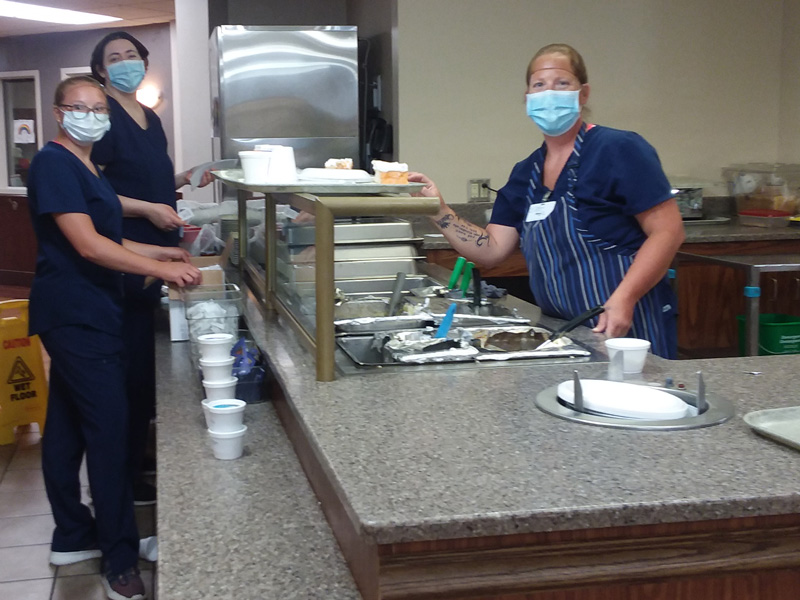Meal delivery has become a more crucial service than ever at Good Samaritan Society locations since the pandemic began.
Dining rooms where residents used to enjoy meals and fellowship are closed for the time being. Dietary teams have had to adapt their processes and adjust their schedules to be able to serve residents in a new way.
“We definitely miss seeing our residents out in the dining rooms and they miss seeing each other,” said Amy Munoz, director of food and nutrition services at Good Samaritan Society – Hastings Village in Hastings, Nebraska. “Everyone is in their rooms on three different units. We have everything going out on carts, on room trays.”
Hastings Village has three different units where residents live. One is a COVID-19 unit where any resident who has tested positive is staying.
How meal service has changed
When the dietary team delivers meals to the COVID-19 unit, they ring a doorbell and then push the cart through the door to the staff member on the other side who delivers the meals.
“Our job hasn’t gotten harder, it’s just way, way different,” Munoz said.
Two of her cooks quit before the pandemic started, which made things more complex, but she’s thankful that she’s been able to hire new cooks and get extra help from other areas. Three high school students who are universal workers were able to step in to help with tasks such as wiping surfaces and washing dishes.
“Wherever we need them, they just jump in and do whatever,” Munoz said. “We would’ve been sunk without them.”
How food delivery has changed
In addition to new processes for serving, the team has a new process for receiving the milk, bread, produce and other food that’s delivered.
When a delivery truck arrives, the driver notifies the staff and then drops off the boxes outside the building at Hastings Village.
Before the pandemic, the drivers would bring the items inside and put them where they needed to go, but now extra help from staff has been needed to lift heavy boxes and put items away.
“Our maintenance and purchasing teams have been helping bring those things in. Those guys are lifesavers,” Munoz said. “It’s a lot that they have to carry in.”
Renee Whitney, food and nutrition team leader at Hastings Village, says the delivery schedules have also changed and they never quite know when something will be delivered. Instead of twice a week, items are delivered once a week and the order is a larger quantity than usual.
Help where it’s needed
Despite all the changes, the dietary team has persevered. Some staff members have been there for 20 or 30 years and they all support each other at every turn.
“They’ve done a fantastic job making sure everything is covered and they’ve been fantastic about picking up shifts,” Munoz said. “They always ask, ‘Where can I help?’”
Whatever the day may bring, she says she and her team strive to focus on food prep, sanitation and making sure they’re up to date on regulations.
“Our staff has been absolutely phenomenal. I couldn’t ask for a better staff,” she said. “I can’t say enough about how fantastic they’ve been. They’ve banded together.”
Learn more
- Latest COVID-19 recommendations from Sanford Health providers
- Father and son connect at Good Samaritan Sioux Falls Village
- Good Samaritan iPads ‘bring life’ to residents nationwide
…
Posted In COVID-19, Nonclinical Support Services, Nutrition, Sanford Stories, Senior Services
